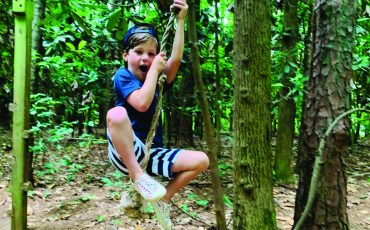The Emotional Sting of Vaccinations

New research shows that while childhood vaccines can prevent serious illnesses, bad shot experiences may scar kids so badly that they don’t want to see doctors later on in life.
Nearly 1-in-4 adults dislikes needles so much that they will delay or forgo medical care, and 75 percent of adults won’t donate blood because of a fear of needles (trypanophobia). Adults may not remember a specific event, but they hold that needle-induced trauma against the entire medical field, says Dr. Amy Baxter, director of emergency research for Pediatric Emergency Medicine Associates and a pediatric emergency physician at Children’s Healthcare of Atlanta at Scottish Rite.
“As pediatricians, we only see children as children. We don’t see the delayed effects of needle-phobia, when some patients actually avoid medical care later in life,” Baxter says. Current research suggests a fear of needles usually develops when a child is around 4 or 5 years old, she says.
There are several reasons shots can be so traumatic at that age, Baxter explains. Some kids can’t distinguish punishment from pain. “They can’t abstract that something painful is medicine to keep them safe,” she says. “Also, around age 5, kids start to have a less intense perception of pain. A 4-year-old will report higher pain than a 5-year-old for the same event.”
After Baxter’s own son was so traumatized by shots that he would literally throw up at the doctor’s office, she developed Buzzy.
The hand-held device, which comes in the shape of a plastic bee (also available in plain black for needle-hating grown-ups), uses a combination of vibration and cold to take the sting out of shots. Currently used in 150 children’s hospitals worldwide, Buzzy is about the size of a computer mouse and can also be used to lessen the pain of IVs and blood-draws. Parents may want to purchase one to tote to the doctor’s office or to treat stings and splinters.
“Like running cold water when you burn your finger, it soothes the pain,” Baxter explains. “The physiology is called ‘gate control.’
The nerve pathway is only big enough for two things. Pain doesn’t have as much room to squeeze through the ‘gate’ past the cold and the vibration.”
Studies have shown Buzzy can reduce IV access pain by about 50 percent for kids 4 years and older. Baxter has received a $1 million grant from the National Institutes of Health to study Buzzy’s effectiveness for immunizations in children “in the hopes that if Buzzy reduces pain, they won’t grow up fearing doctors,” she says.
The medical community may want to reexamine the vaccine schedule for kids’ emotional well-being, Baxter says. “Immunizations don’t hurt kids, but shots do,” she says. “I want to protect kids from preventable deaths and I would absolutely have kids fully immunized, but based on my research, around 5 is a better age to give shots. With more than three shots, a child’s coping mechanism decreases.”
Another reason shots are hard on kids is the lack of control that children have over the situation. If your pediatrician’s office allows, you should let your child make some choices, she says. Does he want to sit on mom’s lap or on the table? Would he like a song or a book or game to look at? What treat would he like afterward?
“We’re still analyzing how much, if any, Buzzy helps very young children,” says Baxter. “In adults, the more anxious they were, the more statistically effective Buzzy was. Babies and some kids still cry no matter what, but older children who know what shots usually feel like tell us how much Buzzy helps.”
Buzzy can be purchased for use at home or at the doctor’s office at buzzy4shots.com or amazon.com for $39.95.
– Lori Solomon







